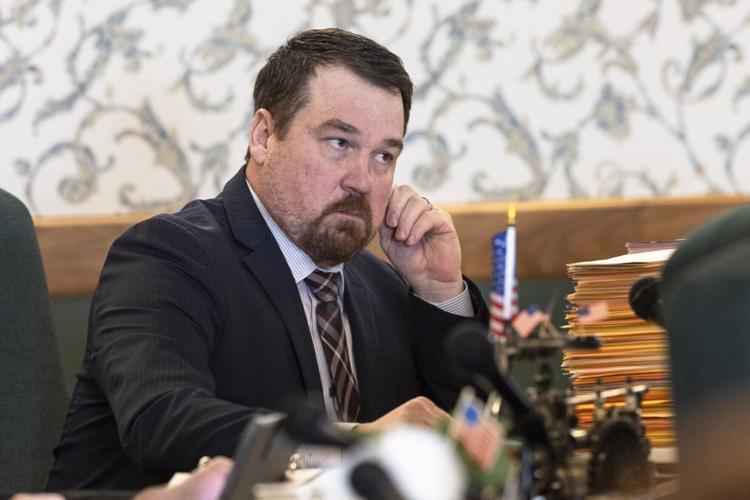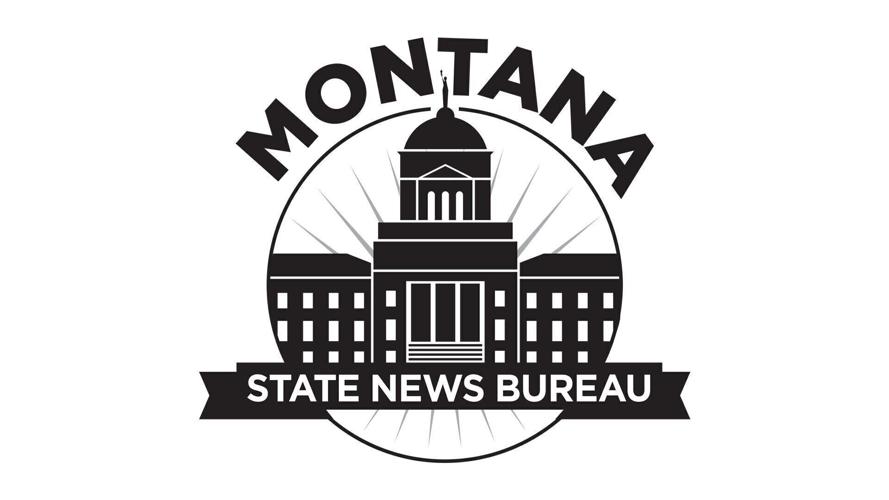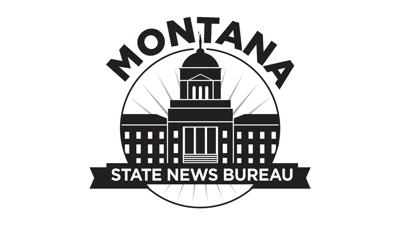Disagreements about what kind of budget best serves the people of Montana were on full display Thursday as the Senate debated the state's two-year spending plan.
Also ever-present was the friction that has divided the chamber the entire session, as the budget looks likely to sail through against the wishes of Republican leadership.
After just three hours of debate, the Senate gave its preliminary stamp of approval to a $16.6 billion, two-year proposal. House Bill 2, the government’s main spending bill, passed its first vote in the upper chamber 27 -23.
Throughout the day, a now-familiar coalition of Democrats plus nine Republicans allied against 23 more conservative GOP senators.
“The cake is baked. We know it,” said Sen. Carl Glimm, a Kila Republican who chairs the Senate Finance and Claims Committee who has repeatedly and openly condemned “The Nine” Republicans for breaking with their caucus. “The board right up there is proof positive.”

Sen. Carl Glimm, R-Kila, speaks during a floor session in the Montana Senate on April 17 where lawmakers debated the state's biennial budget in the state Capitol.
As it stands, HB 2 increases general fund spending by 18% compared to last session's budget. The bulk of that money comes from taxpayer dollars.
It would make significant investments in government-backed health care, correctional facilities and teacher pay. It funds new staff at the Fish, Wildlife and Parks Department and enhanced workforce development programs.
Legislators amend major bills, breaking a weeks-long standstill on MT property tax reform
Senate Minority Leader Pat Flowers, D-Belgrade, celebrated the budget as a fiscally responsible compromise that doesn’t shortchange Montanans of basic services. He disregarded Republicans’ reaction to the coalition steering the chamber through the budget debate as a classic narrative of the minority.
“I feel very good about what we’ve got. I’ve been on the other side of this for three sessions,” Flowers told the Montana State News Bureau. “I know what it’s like to have a budget pass where you don’t feel like your priorities or your choices were reflected in that budget on how we should be committing state dollars to provide programs. So I get their frustration because I’ve been there. But in this case, we had a different seat at the table.”
Senate President Republican Matt Regier, on the other hand, cautioned against runaway spending, especially as lawmakers continue to negotiate property tax relief.

Senate President Matt Regier, R-Kalispell, speaks during a floor session in the Montana Senate on April 17 where lawmakers debated the state's biennial budget in the state Capitol.
But the Senate floor would not be the place to see such trims.
Senators proposed a total of 22 changes to the budget. Most came from Republicans looking to claw back spending, including Regier, the Kalispell Republican who in the first week failed to woo the nine back into the caucus.
Some proposed cuts were smaller, like funding for job service kiosks and $125,000 for the state-run outdoors magazine. Other changes would have been more significant — removing two new game warden positions from FWP and adding $7.3 million for community-based court-ordered evaluators, for example.

Senate Minority Leader Pat Flowers, D-Belgrade, center, talks with republican senators Josh Kassmier, Fort Benton, and Wendy McKamey, Great Falls, during a floor session in the Montana Senate on April 17 where lawmakers debated the state's biennial budget in the state Capitol.
“The more we got into this session, the more we forgot that taxing individuals is directly related to how we spend money,” said Sen. Becky Beard, R-Elliston. “As of late, I’ve just seen the money being doled out like crazy.”
With the help of their nine Republican allies, Democrats look likely to leave their fingerprints on the budget before it moves off the Senate floor. Of the four amendments successfully tacked onto HB 2 on Thursday, all came from that coalition.
Senate President's bid to unite GOP caucus fails
Together, they lowered how much money the Department of Public Health and Human Services can spend on traveling nurses at the Montana State Hospital in favor of hiring permanent employees. Additionally, the group reduced funding for community colleges in the name of reserving funds for other education needs and allocated roughly $873,000 more money to a pre-trial diversion program.
Sen. Josh Kassmier, a Fort Benton Republican seen as one of the leaders of “The Nine,” described HB 2 a “conservative budget” that fulfills the responsibility of the Legislature.
“We have to make sure bridges are safe to travel along and cross. We still have to fund education. We still have to make sure there’s health care in the state for the people,” he said. “We have that obligation to make sure we fund the things that we have to fund.”

Sen. Josh Kassmier, R-Fort Benton, watches another senator speak during a floor session in the Montana Senate on April 17 where lawmakers debated the state's biennial budget in the state Capitol.
The lone vote in which the coalition did not prevail was whether to designate the $40 million allocated for 600 out-of-state prison beds a one-time-only expense rather than an ongoing allocation. Democrats have widely opposed sending more inmates out of state into the custody of CoreCivic, a nationwide private prison company that now holds Montana prisoners in Arizona and Mississippi, along with its facility near Shelby.
Republicans have been warmer to the concept while coaxing along huge spending packages to expand Montana’s existing state-run prison facilities, describing the out-of-state transfers as a temporary measure.
That amendment to the budget died in a 21-29 vote, with three Republicans joining Democrats in favor on Thursday.
“That vote reflected our ongoing dissatisfaction with those out-of-state beds,” Flowers said after the hearing. “We did not have an ongoing conversation with the nine (Republicans) about that so I wasn’t surprised there.”

Sen. Kenneth Bogner, R-Miles City, speaks during a floor session in the Montana Senate on April 17 where lawmakers debated the state's biennial budget in the state Capitol.
HB 2 will face one more procedural vote in the Senate before going back to the House, where lawmakers will have the opportunity to greenlight the few changes made in the other chamber.
According to a Legislative Fiscal Division analysis, the state is currently projected to spend $500 million more than it earns by the next fiscal year without cuts to HB 2 or other bills still in the pipeline.
Some Republicans warned of political and practical consequences should the Legislature continue down this path.

Sen. Greg Hertz, R-Polson, speaks during a floor session in the Montana State Capitol on April 17, 2025, where lawmakers debated the state's biennial budget.
Sen. John Esp, a Republican from Big Timber distinguished as the “Dean of the Senate” as the longest-serving member, criticized his colleagues for making budget decisions with the next election in mind, not the people the budget impacts most.
“You can ignore the vote we took today, but the people stranded in your jails and detention centers that are waiting and waiting for services, and the officers that are charged to humanely take care of those people, can’t ignore it,” Esp said. “You have that luxury; they don’t.”
Glimm said with the way things are going, the governor will be left to find the best places to cut. Gianforte will be able to say “look at the crummy job that the Legislature did… and I had to be the fiscally responsible one,” Glimm added.
Montana House endorses $16.6 billion budget after daylong debate
For his part, Gianforte was hesitant at a press conference on Thursday to wade into proposed cuts before HB 2 reaches his desk, but made a glancing reference to his veto power to strike line items in order to reconcile the budget.
“We don’t want to grow the size of government faster than the rate of inflation,” Gianforte said at a press conference Thursday. “We’re going to use the tools that we have to make sure that we have responsible spending action.”
Considering that backstop at the governor’s office and the two weeks left on the legislative calendar to shape the budget, several members are still optimistic about the process.

The Montana Senate deabtes ammendments to the state's biennial budget during a floor session in the Montana Senate on April 17 in the state Capitol.
Sen. Bruce “Butch” Gillespie, an Ethridge Republican and a member of "The Nine," is in his fourth session, and will be termed out from the upper chamber next year. His committee assignments have always been on the policy side, leaving him at an arm’s length from the messier components of building the budget, and he’s seen those frustrations eventually give way to a balanced budget each session.
“There’s a lot to be done when you’re under the gun,” he said.
Compared to 2017, the year of devastating budget cuts to the state’s funding for community social services, Gillespie noted the Montana Legislature has had a billion dollars or more in surpluses to toy with in the last few sessions.
“Do I believe we can go from a surplus to doom and gloom overnight?” he said after the hearing. “I don’t think so.”
















(0) comments
Welcome to the discussion.
Log In
Keep it Clean. Please avoid obscene, vulgar, lewd, racist or sexually-oriented language.
PLEASE TURN OFF YOUR CAPS LOCK.
Don't Threaten. Threats of harming another person will not be tolerated.
Be Truthful. Don't knowingly lie about anyone or anything.
Be Nice. No racism, sexism or any sort of -ism that is degrading to another person.
Be Proactive. Use the 'Report' link on each comment to let us know of abusive posts.
Share with Us. We'd love to hear eyewitness accounts, the history behind an article.